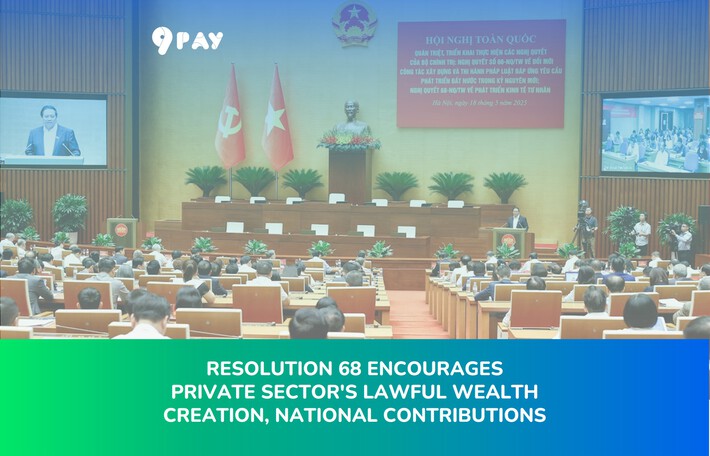Politburo's Resolution 68 encourages private sector's lawful wealth creation, national contributions
The resolution promotes a transparent, competitive business environment, encourages entrepreneurship and lawful wealth creation, and highlights the role of private enterprises in national development.

Prime Minister Phạm Minh Chính on Sunday emphasised that the private sector has increasingly played an important role over nearly 40 years since the initiation of the Đổi mới (Renewal) process, as he presented the core contents of the Politburo's Resolution No.68 on developing the private economy.
In the presentation to disseminate the Resolution at the national conference on Sunday, PM Chính stated that, thanks to efforts to create favourable legal environment and equal rights to enterprises over time, the number of newly established enterprises has seen a sharp increase—from around 5,000 in 1990, to 50,000 in 2000 and 200,000 in 2005 (a 40-fold increase over 15 years).
At present, nearly one million enterprises are operating within the economy.
The private sector has consistently maintained a relatively high growth rate and is the largest contributor to the economy, accounting for approximately 50 per cent of GDP. Since 2016, the growth rate of the private sector has ranged from 6-8 per cent annually, higher than the average national growth rate.
Nonetheless, PM Chính said, the private sector still faces various limitations and challenges. Its potential and internal strengths have not been fully harnessed, and its contribution to the national economy remains inadequate.
Nearly 98 per cent of private enterprises are small and medium-sized, with limited competitiveness, operational efficiency and management capacity. Access to resources, particularly in terms of finance, land and high-quality human resources, remains difficult. Connectivity among private enterprises and between private enterprises and State-owned and FDI enterprises is still limited.
Analysing the underlying causes of these limitations, PM Chính stated that: "Challenges also present opportunities for us to restructure the economy, production chains, markets, and products. The COVID-19 pandemic was a prime example of when we had to restructure our markets, products, and production. Currently, we are working to diversify markets, products and supply chains. This work is primarily driven by enterprises, while the State must play an enabling role."
PM Chính underscored that Resolution No. 68 puts forward five guiding viewpoints that mark a breakthrough in the development of the private economy.
Most notably, the private sector is recognised as one of the most important driving forces of the national economy.
Rapid, sustainable, efficient and high-quality development of the private economy is both an urgent and long-term strategic task. There is a need to completely eliminate outdated perceptions, prejudices and attitudes towards the private economy and to regard entrepreneurs as soldiers on the economic front.
A transparent and open business environment must be created to ensure regional and global competitiveness, foster entrepreneurship and promote lawful wealth creation and national contributions. There's also the need to enhance the leading role of the Party and the facilitating role of the State, with businesses at the centre and to encourage and laud the development of a strong class of entrepreneurs.
This is an issue of exceptional significance, laying a firm foundation to boost development and enhance the role of the private sector in carrying out key national tasks and elevating Việt Nam’s position in the region and the world, PM Chính said.
"We have instructed the Ministry of Home Affairs to prepare a nationwide campaign titled ‘All people emulating efforts to create wealth, build and safeguard the Socialist Republic of Việt Nam’. Once this Resolution is in effect, we will officially launch the national emulation movement for wealth creation," the Government leader added.
The Resolution sets out targets for 2030 and a vision to 2045, aiming for rapid, strong and sustainable development of the Vietnamese private sector with active participation in global production and supply chains, high regional and international competitiveness and a goal of having at least three million enterprises operating in the economy by 2045, contributing over 60 per cent of GDP.
The Resolution outlines eight tasks and solution groups reflecting a spirit of renewal, breakthrough and vigorous reform. These focus on transforming mindsets, building a high degree of unity in awareness and action, inspiring public trust and national aspiration, and creating new momentum and energy for private sector development.
The PM considered this to be a top priority and a matter of strategic importance to lay the groundwork for the growth of the private economy. This includes unified recognition and action from Party committees, governments at all levels, the entire political system, the business community and the people regarding the role and position of the private sector.
Regarding the group of solutions aimed at reforming and enhancing institutional quality and policies, and effectively ensuring and protecting ownership rights, property rights, freedom of business, fair competition and contract enforcement, the PM emphasised that these measures are intended to thoroughly and effectively resolve institutional bottlenecks, turning them into a driver for private sector growth.
He also called for clear distinctions between criminal, administrative and civil responsibilities to strengthen business and investor confidence and promote private sector development.
"When handling economic and civil violations, the principle is to prioritise civil, economic and administrative measures first, and allow voluntary remediation of violations and losses. In practice, if the law allows for non-criminal handling, we must resolutely refrain from criminal prosecution. Where criminal prosecution is deemed necessary, economic remediation should be prioritised as a key basis for determining subsequent legal action. Retroactive application of legal provisions that negatively affect businesses is prohibited, and the presumption of innocence must be ensured during investigation and adjudication processes."
PM Chính also pointed out a notable new element of the Resolution - specific solutions to existing challenges in land, credit, and high-quality human resources.
These include enhancing access to land and business premises for the private sector, expanding and diversifying capital sources and improving workforce quality.
The Government will launch a training programme for 10,000 chief executive officers and promote education and training in creativity, STEM, foreign languages and digital skills across all education levels, to meet the demand for high-quality human capital linked with scientific-technological development, innovation and entrepreneurship.
At the same time, the Resolution calls for advancing science and technology, innovation, digital and green transformation and sustainable and efficient business practices in the private sector. It also promotes stronger links among private enterprises, and between private, State-owned and foreign-invested enterprises. There is a clear orientation to rapidly form and develop medium and large-sized enterprises, as well as regional and globally competitive private economic conglomerates.
Substantial and effective support will be provided to small, micro and household businesses to formalise their status, enhance operational efficiency, and contribute more significantly to the national economy. Business ethics will be upheld, corporate social responsibility encouraged, and the entrepreneurial spirit vigorously promoted, creating all favourable conditions for entrepreneurs to engage in national governance.
At the conference, representatives of the business community expressed delight that Resolution No.68 of the Politburo on private sector development had been issued, granting the private economy access to special mechanisms, such as policies on credit, land, taxation and the decriminalisation of economic relations. The Resolution is expected to enable enterprises to formulate breakthrough business strategies and solutions in the time ahead.
Read more:








